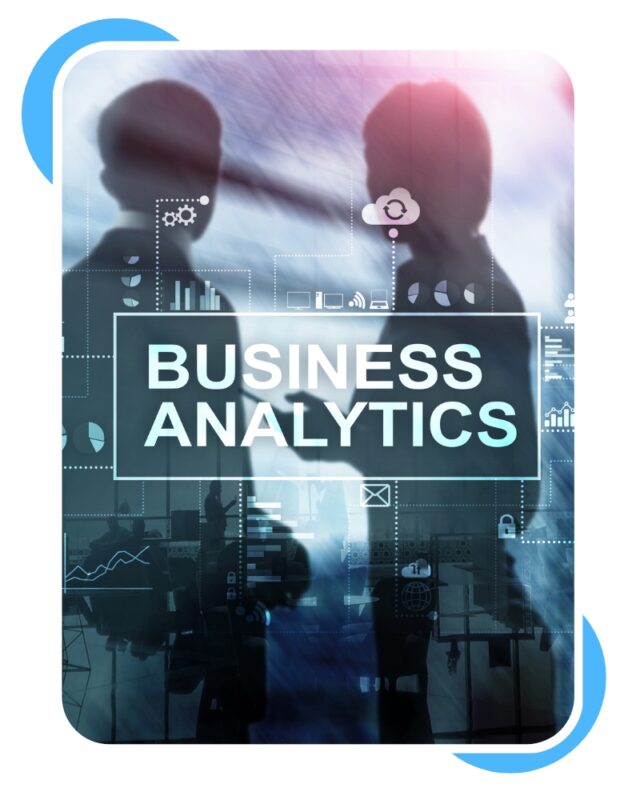
Business analytics uses data analysis and statistical methods to extract insights and information from business data to inform decision-making. It involves using various techniques and tools to examine data and identify trends, patterns, and relationships.
There are several types of business analytics, including descriptive analytics, which involves using data to understand what has happened in the past; diagnostic analytics, which consists in identifying why something happened; predictive analytics, which involves using data to make predictions about future outcomes; and prescriptive analytics, which involves using data to recommend courses of action.
Business analytics can be used in various contexts, such as marketing, finance, operations, and human resources. It can help companies identify growth opportunities, optimize operations, improve customer experiences, and reduce costs.

How To Learn Business Analytics?
There are several ways to learn business analytics:
Online courses
Many online platforms offer courses in business analytics, such as Coursera, edX, Udemy, and DataCamp. These courses can range from beginner-level to advanced and cover various topics like data visualization, statistical analysis, and machine learning.
University courses
Several universities offer courses and degrees in business analytics, such as Master of Business Analytics (MBA), Master of Science in Business Analytics (MSBA), or Master of Science in Data Analytics (MSDA). These programs provide a comprehensive education in analytics and often require a significant time and financial investment.
Bootcamps
Bootcamps are intensive training programs that provide hands-on experience in analytics. These programs can last from a few weeks to a few months and often require a significant financial investment. Some popular boot camps for business analytics include General Assembly, Metis, and Flatiron School.
Self-study
Self-study can involve reading books and articles on business analytics, participating in online forums and communities, and practising with datasets. This method can be time-consuming, but it allows for a flexible schedule and can be done at little to no cost.
Regardless of the method chosen, it is essential to practice with real-world data and projects to develop practical skills in business analytics. It is also crucial to stay up-to-date with the latest trends and technologies to remain competitive and relevant.

Benefits of Learning Business Analytics:
Learning business analytics can provide several benefits, including:
Better decision-making
Business analytics can help you make data-driven decisions based on insights and trends identified in large datasets. This can lead to more informed and accurate decision-making, positively impacting business outcomes.
Improved efficiency
Business analytics can help streamline business operations by identifying areas that need improvement, reducing waste, and increasing productivity. This can lead to cost savings and improved efficiency.
Competitive advantage
Businesses that utilize business analytics can gain a competitive advantage over their competitors by identifying new opportunities, improving customer experiences, and making better decisions.
Career Advancement
Business analytics is a highly sought-after skill set in today’s job market, and learning it can lead to career advancement opportunities. Many companies seek professionals with data analysis and business analytics expertise.
Improved job performance
Learning business analytics can help professionals improve their job performance by providing the tools and knowledge needed to make better decisions and solve problems more effectively.
Flexibility
Business analytics can be applied to various industries and functions, providing professionals with a versatile skill set that can be utilized in many different contexts.
Learning business analytics can provide individuals and businesses with various benefits, including improved decision-making, efficiency, competitiveness, career advancement, job performance, and flexibility.

Career After Learning Business Analytics
Learning business analytics can open up several career paths in various industries, including:
Data Analyst
Data analysts work with data to identify patterns, trends, and insights that can inform business decisions. They also create visualizations and reports to communicate their findings to stakeholders.
Business Analyst
Business analysts use data to identify problems and opportunities within a company and recommend solutions to improve operations, increase profitability, and reduce costs.
Data Scientist
Data scientists use advanced statistical and machine learning techniques to analyze data and build predictive models that can be used to inform business decisions.
Marketing Analyst
Marketing analysts use data to measure the effectiveness of marketing campaigns, identify target audiences, and develop strategies to improve customer engagement and retention.
Financial Analyst
Financial analysts use data to analyze financial performance, identify trends, and develop forecasts to inform financial decision-making.
Operations Analyst
Operations analysts use data to optimize processes, reduce waste, and improve company operations efficiency.
Management Consultant
Management consultants work with companies to identify opportunities for growth and improvement, often utilizing data analysis to inform their recommendations.
Overall, a career in business analytics offers a wide range of opportunities for professionals in various industries. With the growing importance of data-driven decision-making, the demand for professionals with expertise in business analytics is expected to continue to increase.

Salary After Learning Business Analytics in India
The salary for professionals in business analytics in India can vary depending on several factors, such as experience, industry, and location. According to Payscale, the average salary for a business analyst in India is around INR 6 lakhs per annum. In contrast, a data analyst can expect an average salary of around INR 4 lakhs annually.
The average salary for a data scientist is around INR 10 lakhs per annum, while a marketing analyst can expect an average salary of around INR 7 lakhs per annum.
However, it is essential to note that these are just average salaries and can vary significantly based on location, company size, industry, and experience. For example, professionals in metropolitan cities like Mumbai, Delhi, and Bangalore can earn higher salaries than those in smaller cities or towns.
Additionally, professionals with advanced skills and certifications in business analytics can command higher salaries. For example, a certified business analytics professional can expect to earn an average salary of around INR 9 lakhs per annum. In contrast, an accredited data scientist can expect an average salary of around INR 13 lakhs annually.

How to Succeed in a Business Analytics
To succeed in business analytics, there are several critical skills and strategies that professionals should focus on:
Develop Strong Technical Skills
A solid foundation in technical skills such as data analysis, statistics, and programming languages such as SQL, R, and Python is essential in business analytics. Continuously improving and updating technical skills is vital to stay up-to-date with the latest tools and technologies.
Understand the Business Context
Business analytics professionals should have a solid understanding of the industry they are working in, including the business goals, objectives, and challenges. Understanding the business context is critical in identifying opportunities and developing practical solutions.
Communicate Effectively
Communicating complex data and insights clearly and concisely is essential in business analytics. Professionals should effectively communicate their findings to stakeholders in a way that is easy to understand.
Develop Critical Thinking Skills
Critical thinking skills are essential in business analytics because they involve analyzing large datasets and identifying insights that inform business decisions. Professionals should be able to think critically and solve complex problems.
Collaborate with Others
Business analytics often involves working with cross-functional teams, so collaborating effectively with others is essential. Professionals should work with others towards a common goal and be able to adapt to different working styles.
Stay up-to-date with Industry Trends
Business analytics is a rapidly evolving field, so it is essential to stay up-to-date with the latest trends, tools, and technologies. Continuous learning and professional development are crucial to staying ahead in the field.
succeeding in business analytics requires combining technical skills, business acumen, communication skills, critical thinking, collaboration, and continuous learning. Professionals can excel in their careers and significantly contribute to their organizations by focusing on these essential skills and strategies.
Common Challenges in Learning Business Analytics
Learning business analytics can be challenging, and professionals may encounter several obstacles. Some common challenges in learning business analytics include:
Technical Complexity
Business analytics requires a solid technical foundation in data analysis, statistics, and programming. This can be challenging for those with a strong background in these areas.
Data Quality
Working with large datasets can be challenging, especially when the data needs to be completed, consistent, or contain errors. Cleaning and pre-processing data can be time-consuming and requires attention to detail.
Keeping Up with New Technologies
Business analytics is rapidly evolving, and new tools and technologies are continuously being developed. These changes can be challenging and require continuous learning and professional development.
Lack of Business Context
Understanding the business context is critical in business analytics, and professionals may need help applying their technical skills in the business context. This requires a deep understanding of the industry, business goals, and objectives.
Communication
Communicating complex data and insights to stakeholders clearly and concisely can be challenging. Professionals may need help communicating their findings and recommendations to non-technical stakeholders effectively.
Overwhelming Amount of Data
With the increasing volume of data available, professionals may feel overwhelmed by the amount of data they need to analyze and process. Prioritizing data and focusing on the most relevant information is essential.
To overcome these challenges, professionals can seek additional training and education, participate in online forums and communities, seek mentorship from experienced professionals, and stay up-to-date with the latest tools and technologies.

Advantages and Disadvantages of Business Analytics.
Sure, here are the advantages and disadvantages of Business Analytics:
Advantages of Business Analytics
1. Improved Decision Making: Business analytics provides businesses with actionable insights to make informed decisions, which can lead to better outcomes.
2. Cost Optimization: Business analytics helps organizations identify inefficiencies and cost-saving opportunities, resulting in significant cost savings.
3. Competitive Advantage: With business analytics, companies can gain a competitive edge by identifying market trends, customer preferences, and competitor strategies.
4. Improved Customer Experience: Business analytics helps organizations understand their customers’ needs and preferences, enabling them to personalize their offerings and improve customer experience.
5. Predictive Analytics: Business analytics can predict future trends and outcomes, enabling companies to plan and strategize proactively.
Disadvantages of Business Analytics
1. Data Quality: Business analytics is only as good as data quality. Quality data can lead to accurate insights and better decision-making.
2. Privacy Concerns: Using customer data for business analytics can raise privacy concerns, and businesses must comply with relevant data protection laws.
3. Technical Expertise: Business analytics requires technical expertise and specialized software tools, which can be expensive and challenging to acquire.
4. Complexity: Business analytics can be complex, and the insights generated can be challenging to interpret and act upon without proper training and expertise.
5. Dependence on Technology: Business analytics relies heavily on technology, and any technological failures or disruptions can impact the accuracy and usefulness of the insights generated.

FAQs Related to Business Analytics
Sure, I would be happy to help! Here are some frequently asked questions related to Business Analytics:
Business Analytics uses data and statistical methods to analyze business operations and make informed decisions.
Business Analytics can use various data types, such as customer, sales, financial, operational, and marketing data.
Business Analytics helps organizations improve decision-making, optimize costs, gain a competitive advantage, improve customer experience, and predict future trends.
Some standard tools used in Business Analytics include data visualization software, statistical software, and machine learning algorithms.
A Business Analyst is responsible for analyzing data, identifying trends, and providing insights to the business to improve decision-making.
Business Analytics is focused on using data to identify trends and make informed decisions, while Business Intelligence is focused on using data to monitor business performance and provide reports.
Some potential drawbacks of using Business Analytics include data quality issues, privacy concerns, technical expertise requirements, complexity, and dependence on technology.
Predictive Analytics is a subset of Business Analytics that uses statistical modelling and machine learning techniques to predict future outcomes based on historical data.
